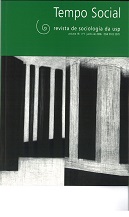Mutations of work and urban experience
DOI:
https://doi.org/10.1590/S0103-20702006000100010Keywords:
Mutations of work, Urban reconfigurations, Generational difference, Social practices, Social experienceAbstract
This article inquires into the societal dimensions of contemporary mutations of work, in particular their disconnection from employment mechanisms through various forms of casual work and outsourcing. In other words, it asks in what way the new realities of work (and non-work) redraw the social world, the relations of force and the fields of practices that make up the texture of the city and its spaces. The circumstances of casual and intermittent labour alter the time and space of social experience, as well as the urban experience itself in the decentred circuits we can denominate "territories of precariousness". The article proposes to investigate these new realities by following the paths and urban trajectories of the new generations. It suggests that this is a fertile entry point for describing this redefined social world: the difference between generations today has the historical peculiarity of coinciding with deep changes in the world of work and in urban dynamics. This is also a way of re-approaching the question of the meanings of work and its structuring effects on social life.Downloads
References
ASPE, Bernard; COMPES, Muriel & LAZZARATO, Maurizio. (1996). “Le travail: un nouveau débat por de vieilles alternatives”. Futur Antérieur, 35-36, Paris, site www.multitudes.samizdat.net, consultado em 04/02/2006.
BEAUD, Stéphane & PIALOUX, Michel. (2003), Violences urbaines, violence sociale: genèse des nouvelles classes dangereuses. Paris, Fayard.
BESSIN, Marc. (1999), “Les temps, une question de pouvoir”. Mouvements, 2: 47-54, jan., fev., Paris.
CALDEIRA, Teresa. (2000), A cidade dos muros: violência, segregação e cidadania na cidade de São Paulo. São Paulo, Editora 34.
DELEUZE, Gilles. (1992), “Post-scriptum sobre as sociedades de controle”. In: Conversações. São Paulo, Editora 34, pp. 219-226.
EHEREMBERG, Alain. (1991), Le culte de la performance. Paris, Hachette Littératures.
HARVEY, David. (1996), “Do gerenciamento ao empresariamento: a transformação da administração urbana no capitalismo tardio”. Espaço e Debates, 39: 121-145, São Paulo.
KHEL, Maria Rita. (2000), Função fraterna. Rio de Janeiro, Relume-Dumará.
KURZ, Robert. (1992), O colapso da modernização. Rio de Janeiro, Paz e Terra.
LATOUR, Bruno. (2000), “Faktura: de la notion de réseaux à celle d’attachement”. In: MICOUD, André & PERONI, Michel. Ce qui nous relie. Paris, Éditions de l’Aube, La Tour d’Aigues, pp. 189-208.
LAZZARATO, Maurizio (2002). “Le concept de travail immatériel: la grande entreprise”. Futur Antérieur, 10. Paris, site www.multitudes.samizdat.net, consultado em 05/05/2005.
LE MARCHAND, Arnaud. (2004). “Travail intermittent et production de la ville post-fordiste”. Multitude, 17. Paris, site www.multitudes.samizdat.net, consultado em 04/02/2006.
OLIVEIRA, Francisco de. (2003), “O ornitorrico”. In: Crítica à razão dualista. O ornitorrinco. São Paulo, Boitempo, pp. 121-150.
SASSEN, Saskia. (1998), As cidades na economia global. São Paulo, Nobel.
SENNET, Richard. (2000), A corrosão do caráter. Rio de Janeiro, Record.
SUPIOT, Alain. (1994), Critique du droit du travail. Paris, PUF.
SUPIOT, Alain. (1999), Au-delà de l’emploi: transformations du travail et devenir du droit du travail en Europe. Paris, Flamarion.
TELLES, Vera S. (2006), “Trajetórias urbanas: fios de uma descrição da cidade”. In: TELLES Vera S. & CABANES, Robert (orgs.). Nas tramas da cidade: trajetórias urbanas e seus personagens. São Paulo, Humanitas (no prelo).
TELLES, Vera S. & CABANES, Robert (orgs). (2006), Nas tramas da cidade: trajetórias urbanas e seus personagens. São Paulo, Humanitas (no prelo).
THOMPSON, Edward. P. (1979), Tradición, revuelta, consciencia de clase: estudios sobre la crisis de la sociedad preindustrial. Barcelona, Crítica.
VELTZ, Pierre. (1996), Mondialisation, villes et territoires: l’économie d’archipel. Paris, PUF.
ZALUAR, Alba. (1996), “A globalização do crime e os limites da explicação local”. In: VELHO, Gilberto & ALVITO, Marcos (orgs.). Cidadania e violência. Rio de Janeiro, Editora da FGV/Editora da UFRJ, pp. 48-68.
ZARIFIAN, Philippe. (2000), “Engajamento, disciplina e controle”. Novos Estudos. 64: 23-33, nov., São Paulo.
ZARIFIAN, Philippe. (2003), “La disparition du marché”. In: ZARIFIAN, Philippe. A quoi sert le travail? Paris, La Dispute, pp. 135-147.
Downloads
Published
Issue
Section
License
Copyright (c) 2015 Tempo Social

This work is licensed under a Creative Commons Attribution-NonCommercial 4.0 International License.


